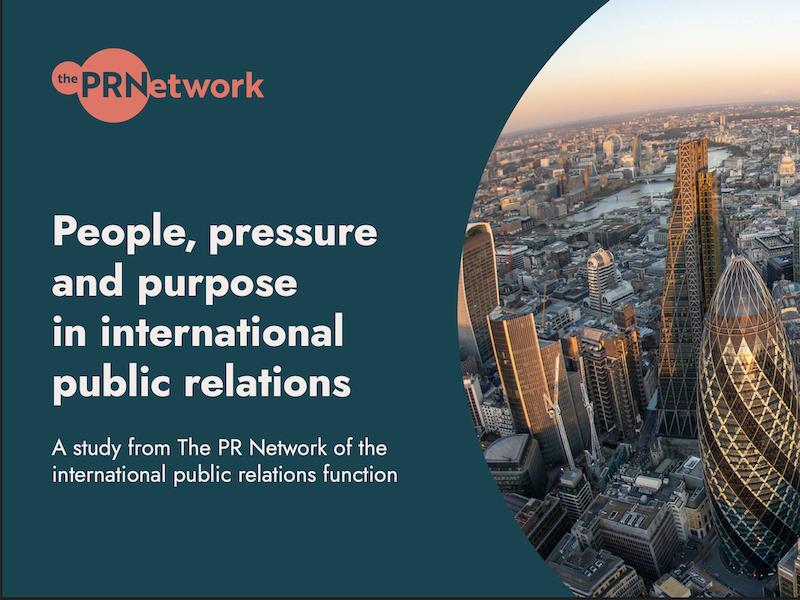
Study: International Communications Has Outgrown Media Relations To Become A Strategic Management Function
Based on in-depth interviews with senior communication leaders across multiple sectors and regions, the report – 'People, Pressure and Purpose in International Public Relations' – lifts the lid on how global PR is evolving.
The research highlights how the traditional view of international PR as solely delivering media relations no longer holds true. It finds that international public relations teams unlock markets and shape and manage reputation, yet they're often operating without the resources, influence or visibility their impact warrants.
Seven key themes emerged from the research: the positioning of international PR as a core strategic capability; structural models that adapt to organisational maturity and market context; the critical role of local insight and cultural fluency under global pressure; the human cost of international delivery, notably pressure, burnout and purpose; a redefined media strategy focused on influence, trust and credibility over coverage reach; a call for more meaningful, business-linked measurement frameworks; and a future for international PR built on“confidence, capability and care”.
The report was authored by Stephen Waddington, director of Wadds Inc, who told PRovoke Media:“International public relations has outgrown the narrow frame of media relations. Practitioners are advising leaders, opening markets, managing risk and shaping organisational resilience.
“The function gives management a vital early warning system, cultural intelligence and strategic counsel that no other discipline provides. But this work comes at a cost: people are stretched across time zones and cultures, carrying pressure that is too rarely recognised. If international public relations is to thrive as a management discipline, it must be valued, resourced and made sustainable for the people who deliver it.”
Key findings of the report include:
-
Moving beyond media relations: international PR is embedded in leadership decisions, shaping market entry, managing crises, and acting as a conscience to the organisation
People under pressure: international PR professionals are stretched thin, often managing multiple markets with little support or recognition. Mental health and burnout are rising concerns
No single model fits all: successful teams design for flexibility mixing centralised strategy with local execution, depending on market maturity and business goals
Local voices matter: organisations that empower local insight see greater credibility and impact in-market. Those that don't, risk global strategies falling flat
Measurement mismatch: many teams are still judged on outdated metrics. New frameworks prioritising reputation, resonance and business alignment are essential.
PRN, which delivers flexible strategic global PR programmes via its network of over 1,400 senior experts spanning 60 countries, is calling for a sector-wide reset.
Agency MD Eileen Boydell told PRovoke Media:“This report is a rallying cry for the PR industry, and confirms what many of us in the comms industry have felt for a while: international public relations has long outgrown its traditional role and become a strategic management function. We're not just executing media relations - we're acting as door openers for new markets, building brand distinctiveness and helping organisations navigate complexity and risk.
“It's an essential read for communications leaders who want to understand how to formalise this strategic value and embed it within their business, from structuring teams for resilience to developing a clear framework for measuring true impact. It's an important reminder that our role is central to business performance, but to make it sustainable, we must continue to advocate for a seat at the leadership table and get recognition, authority and proper support for our teams.”
The 25 in-house leaders interviewed at length for the report included Rebecca Cradick, VP of corporate communications at software firm Armis, who told PRovoke Media:“The report brilliantly highlights the very human element and broad skill set required to deliver the strategic value of international public relations.
“Having worked with practitioners at brands large and small, I have seen first-hand how the most effective teams aren't just well-structured; they're built on cultural fluency, emotional intelligence, and trust within a global framework. It's a role that demands constant adaptation and a deep understanding of local nuances, which is often a heavy burden on in-house practitioners who are trying to do it all, but often don't have a seat at the table.
“Business leaders need to recognise this 'invisible' labour and invest in the people who deliver the work, ensuring their well-being and providing the necessary resources they need to thrive in an ever-changing world.”

Legal Disclaimer:
MENAFN provides the
information “as is” without warranty of any kind. We do not accept
any responsibility or liability for the accuracy, content, images,
videos, licenses, completeness, legality, or reliability of the information
contained in this article. If you have any complaints or copyright
issues related to this article, kindly contact the provider above.
















Comments
No comment